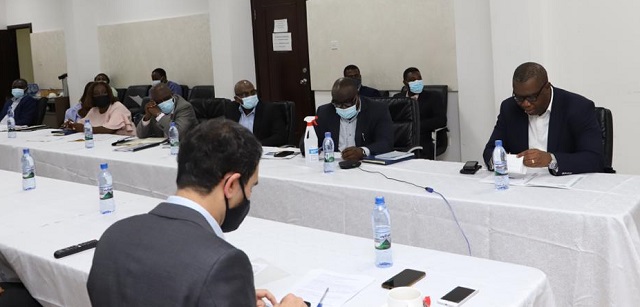
Petroleum Commission, Tullow Ghana train suppliers on ethics & compliance
Ghana’s upstream oil and gas industry regulator has expressed concern that there are still significant barriers for indigenous Ghanaian companies’ participation in the country’s oil and gas industry, more than six years after the implementation of Local Content and Local Participation regulations.
The Petroleum Commission says as it is now, only a fraction of spending by the international oil and gas companies (IOCs) and major service companies are done in-country and to Ghanaian companies.
Compliance
The Chief Executive Officer of the Petroleum Commission, Egbert Faibille Jnr. made this known during a joint virtual supplier training on ethics compliance organized by the Commission and Tullow Ghana Limited.
The training would go beyond satisfying the requirements for tendering and help equip indigenous companies with the relevant knowledge, and also help them incorporate global best practices in their business operations. It would also not only make them highly competitive for Tullow bids, but a supplier of choice according to global oil and gas standards.

Regulations
He said the Petroleum (Local Content and Local Participation) Regulations, 2013, (L.I. 2204) have not impacted much, calling the situation very disappointing and unacceptable.
Mr. Faibille Jnr said given the fact that Ghanaians do not only own the resources that finance these expenditures but that the resources are also exhaustible, the Commission in 2018 created the Business Advisory and Enterprise Development Department to help.
That department, he said, was among other things providing business advisory support and appropriate capacity development for indigenous Ghanaian companies to meet the requirements of the industry.
“I can report that 18 workshops in nine thematic areas were organised to address critical knowledge gap areas that adversely affect the realisation of the expectations of the Local Content and Local Participation Regulations,” he said.
The workshop, Mr. Faibille Jnr said, was aimed at addressing the problem of information asymmetry, which limits the competitiveness of indigenous companies.
Meeting expectations
Business ethics and compliance, he said, are key components in making contract award decisions, explaining that "quite a number of indigenous companies have fallen short of meeting expectations in this area.” He said available data on registered indigenous Ghanaian companies and feedbacks from tender evaluation and the award of contracts indicate that corporate governance and ethical issues were among key challenges facing IGCs in winning contracts.
“There is therefore the need not only to bring this issue to the fore but also identify ways of overcoming the challenge,” he said.
For his part, the Managing Director of Tullow Ghana Ltd, Mr. Wissam Al-Monthiry said supplier development is an important component of Tullow’s local content strategy and has been an effective means by which the company has consistently increased indigenous participation in its operations.
Industry-specific training
“Tullow is proud to partner with the Petroleum Commission to deliver a series of practical industry-specific training in specialized subject areas that align with the curriculum of the country’s upstream petroleum business academy,” he said.
Supplier engagement sessions, he said, including but not limited to pre-tender, post-tender feedback, bespoke finance, insurance, joint venture formation and permitting training have resulted in better quality and more competitive bid submissions from local companies over the past 10 years.
In that regard, Mr. Al-Monthiry said the company has seen a steady and significant increase in the value of contracts awarded to indigenous companies over the last decade.
“Undeniably, these development initiatives becomes even more important as the Ghana business focuses on delivering maximum value from the Jubilee and TEN fields under the Ghana Value Maximization Plan,” he said.